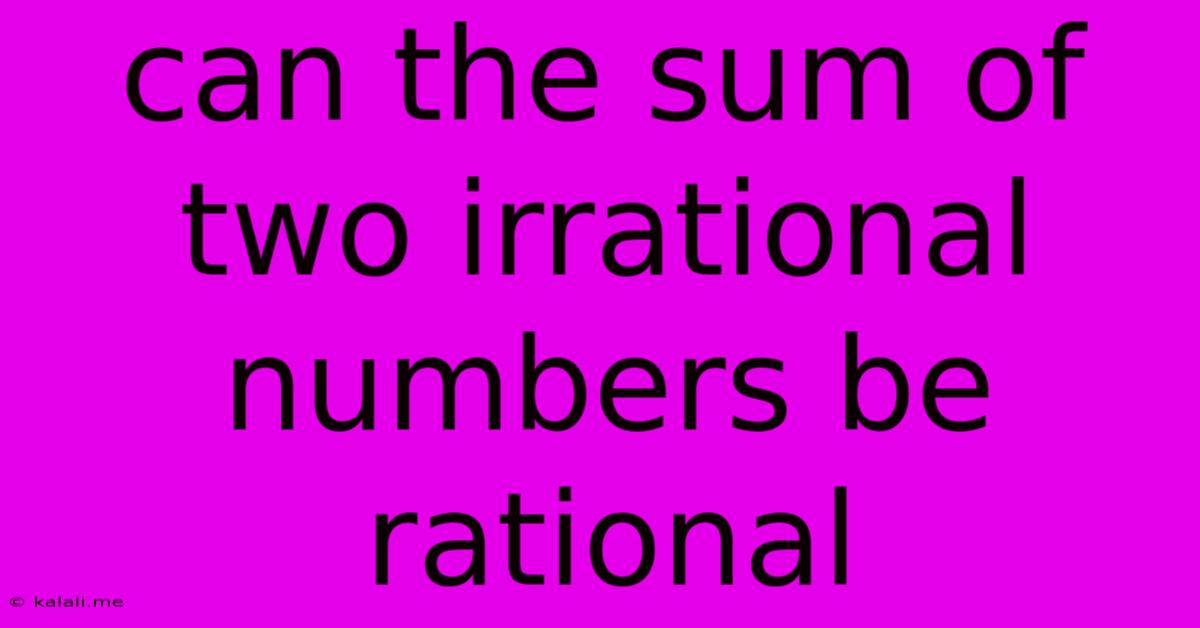Can The Sum Of Two Irrational Numbers Be Rational
Kalali
Jun 11, 2025 · 3 min read

Table of Contents
Can the Sum of Two Irrational Numbers Be Rational? A Deep Dive into Irrational Numbers and Their Surprising Properties
Meta Description: Explore the fascinating world of irrational numbers. This article unravels the mystery of whether adding two irrational numbers can result in a rational number, providing clear examples and explanations. Learn about the properties of irrational numbers and their relationship to rational numbers.
The question of whether the sum of two irrational numbers can be rational is a surprisingly nuanced one within the field of mathematics. Intuitively, one might assume the answer is no – after all, irrational numbers are defined by their inability to be expressed as a simple fraction (a ratio of two integers). However, the reality is more intriguing than that. The answer is: yes, the sum of two irrational numbers can indeed be rational.
This article will explore this seemingly paradoxical situation, providing clear examples and explanations to solidify your understanding.
Understanding Rational and Irrational Numbers
Before diving into the core question, let's refresh our understanding of rational and irrational numbers.
-
Rational Numbers: These numbers can be expressed as a fraction p/q, where p and q are integers, and q is not zero. Examples include 1/2, 3, -4/5, and 0. Rational numbers have either terminating or repeating decimal expansions.
-
Irrational Numbers: These numbers cannot be expressed as a fraction of two integers. Their decimal expansions are non-terminating and non-repeating. Famous examples include π (pi), e (Euler's number), and the square root of 2 (√2).
The Proof: Finding Irrational Numbers That Sum to a Rational Number
The key to understanding how two irrational numbers can sum to a rational number lies in carefully selecting our irrational numbers. Consider the following example:
Let's take the irrational number √2. We know its decimal expansion goes on forever without repeating. Now, consider the irrational number 2 - √2. This is also irrational. Let's add them together:
√2 + (2 - √2) = 2
Notice what happened? The irrational parts, √2 and -√2, canceled each other out, leaving us with the rational number 2. This demonstrates conclusively that the sum of two irrational numbers can, in fact, be rational.
More Examples and Exploration
This isn't an isolated incident. We can construct countless pairs of irrational numbers that add up to rational numbers. For instance:
- π + (4 - π) = 4
- √3 + (1 - √3) = 1
- e + (1 - e) = 1
The pattern is that we're essentially constructing the second irrational number as the additive inverse of the first (with a rational component added to maintain irrationality). This ensures the irrational parts cancel each other out, leaving a rational sum.
Implications and Further Considerations
This property of irrational numbers highlights the richness and complexity of the number system. While seemingly counter-intuitive at first, understanding this concept strengthens our grasp of mathematical fundamentals. It emphasizes that the behavior of irrational numbers isn’t always as straightforward as it might initially appear. This understanding is crucial for advanced mathematical concepts and applications.
Conclusion
The sum of two irrational numbers can be rational. By strategically selecting pairs of irrational numbers where their irrational components cancel each other out, we can obtain a rational result. This concept showcases the subtleties and intricacies within the world of numbers, underscoring the importance of careful mathematical reasoning and analysis.
Latest Posts
Latest Posts
-
Which Of The Following Is Not A Symptom Of Depression
Jun 13, 2025
-
What Overall Reaction Consists Of The Following Three Elementary Steps
Jun 13, 2025
-
35 Of What Number Is 105
Jun 13, 2025
-
What Is The Difference Between Subsistence Farming And Commercial Farming
Jun 13, 2025
-
Number Of Significant Figures In 0 06900
Jun 13, 2025
Related Post
Thank you for visiting our website which covers about Can The Sum Of Two Irrational Numbers Be Rational . We hope the information provided has been useful to you. Feel free to contact us if you have any questions or need further assistance. See you next time and don't miss to bookmark.